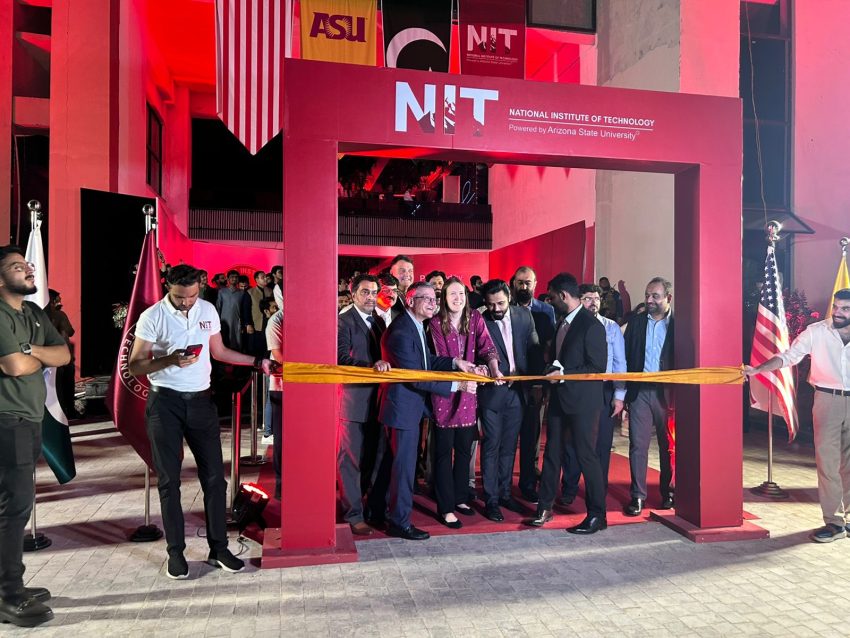LAHORE – In a significant step to enhance higher education collaboration, Pakistan and the United States jointly launched the National Institute of Technology (NIT) on Friday.
Developed in partnership with Arizona State University (ASU), the NIT aims to serve as a centre for innovation, leadership, and practical learning in Pakistan.
During the inauguration ceremony, U.S. Consul General in Lahore Christin K. Hawkins described the establishment of the NIT as a testament to the United States’ ongoing commitment to advancing education in Pakistan. She stated, “This partnership is about more than just infrastructure. It’s about nurturing ideas, driving innovation, and preparing the next generation of leaders.”
Highlighting the broader significance of academic collaborations, Hawkins noted that the US-Pakistan partnership aims to create platforms for Pakistani students to explore emerging fields such as technology, engineering, and entrepreneurship within a globally connected environment.
The event brought together government officials, educationists, private sector representatives, and a delegation from ASU, including Cagri Bagcioglu, Executive Director of Global Academic Initiatives. Bagcioglu hailed the launch as a significant milestone and reiterated ASU’s support in developing a cutting-edge curriculum, training programmes, and academic exchanges. “We are committed to helping NIT leave a lasting impact on thousands of young minds in Pakistan,” he said.
Shahzeb Shabbir, the founder of NIT, stated that the institute was born out of the urgent need to establish modern institutions that address today’s education and employment challenges. “We are creating more than just a campus—we are creating hope. This is a homegrown initiative guided by global standards,” he said.
Shabbir said NIT will focus on applied sciences, artificial intelligence, engineering, entrepreneurship, and climate technology. He described the project as an “ecosystem” bringing together academia, industry, and government to shape Pakistan’s digital future.
Vice Chairman Jahanzeb Burrana said institutes like NIT prove Pakistan’s youth are full of potential. “What they need are the right platforms. This collaboration with ASU is a clear sign that we are ready to move forward,” he said.
Doug Becker, Chairman of Cintana Education, which partners with ASU in supporting global universities, also addressed the event. He said Pakistan holds immense untapped potential and that the private education sector can play a transformative role by offering scalable and quality-driven solutions.
NIT Vice Chancellor Dr Faisal Bari praised the project’s focus on equity and inclusion. “Access, affordability and relevance must be at the core of every educational venture. I hope NIT becomes a model institution that others can follow,” he said, urging stronger research collaborations and public-private partnerships.
NIT plans to open its doors to its first batch of students in 2025. The curriculum will be jointly developed with ASU faculty, and regular training sessions for Pakistani teachers will be held through academic exchanges. The campus will feature advanced laboratories, a digital innovation centre focused on climate tech, and incubators to support entrepreneurship.
In a bid to promote inclusion, the institute has pledged to reserve at least 30% of its seats for students from underprivileged backgrounds through need-based scholarships.
The launch reflects a growing interest from Pakistan’s private sector to invest in education models that combine social good with sustainable development. As NIT begins its journey, its founding team hopes to inspire similar initiatives nationwide.
Shahzeb Shabbir closed the ceremony by thanking all partners and supporters. “This is just the beginning. With strong local and global backing, we are committed to reimagining what higher education can look like in Pakistan,” he said.













